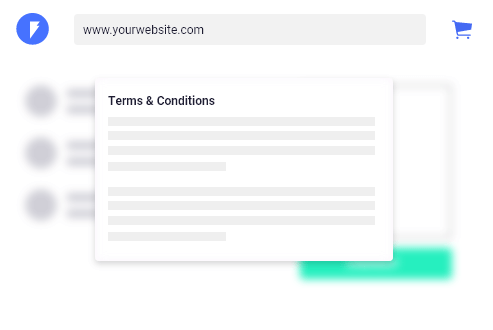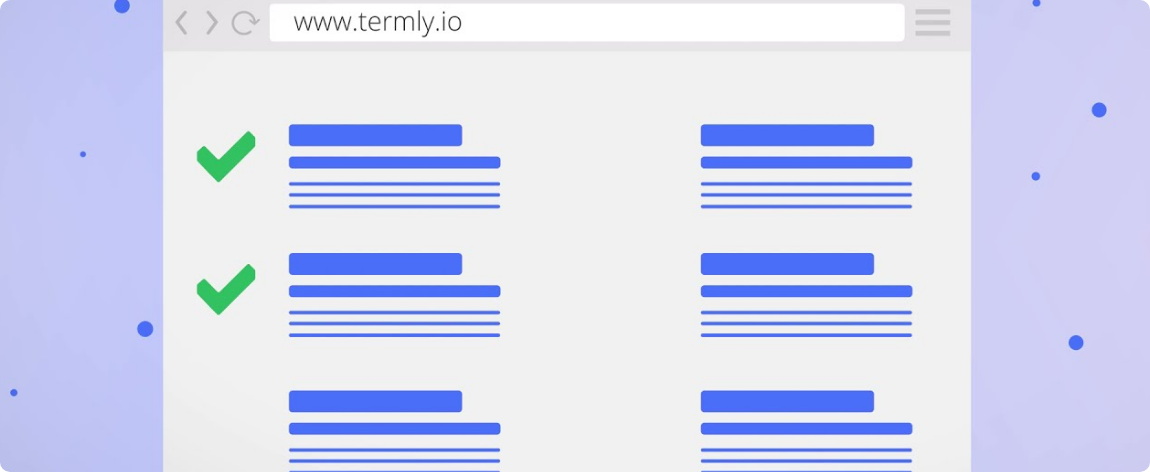
Create a free terms and conditions agreement (aka terms of service or terms of use) for your website or app to better protect your business.

Generate a free terms and conditions to protect your business using one of the best terms and conditions generators.
“The easiest place to generate terms and conditions and a privacy policy to get moving and out to market.”
“It is so easy to use. I don't need to understand the full legal details of everything. It takes you step by step through the whole process.”
“I appreciated how quickly I was able to reach customer support. The person was very helpful in getting me the information I needed to present internally so I could sign us up for Termly!”
“It [Termly] does a great job of walking you through step by step and providing questions to guide you through the process and make sure you don't miss anything.”
Follow these simple steps to generate a custom terms and conditions agreement
for your business, software, site, app, or any other need:
Create your terms in just a few minutes using our terms and conditions builder.
Customize your terms to be as comprehensive or as simple as you’d like.
Add your terms and conditions to your website or app using HTML, code snippet, or a hosted URL.
We guide you through the process of generating a terms and conditions agreement by asking a few simple questions about your business – Yasmeen, Privacy Engineer @ Termly

Our online terms & conditions generator works for any business on any platform.
Terms of use are critical for protecting your website or blog. You can use them to prevent unwanted or inappropriate behavior from your users, provide details on how they are allowed to use your website or blog content, and explain how and why a user might have their account terminated. Terms and conditions can be especially important if you allow users to leave comments, post reviews, or interact with your website or blog in other ways.
Terms of service can be just as important for mobile apps as they are for websites. Mobile app terms detail the rules and requirements that users must agree to in order to use your app. They act as a binding contract between you and your users and can help protect the rights of both the app owner and the user.
Additionally, some app marketplaces may require that you publish information about your users’ rights and requirements when using your app. Your terms can be an easy way to present that information.
If you sell physical or online products or services, terms of use can be critical to ensure you can appropriately handle purchases, refunds, and disputes. For example, if you sell a physical product, you can include information about liabilities in the case of issues arising from misuse of the product.
If you sell digital products or services, you can include information about intellectual property, use and misuse of your product or service, and other information to ensure seamless sales and customer service.
Software-as-a-service (SaaS) products are becoming more commonplace. If you run this type of business, terms of use are critical for your protection. You include details about how and when users can cancel their SaaS subscription, how users are allowed to use the product, payment, and warranty info, and more.
We answer the most frequently asked questions about our free terms and conditions generator.
Yes! Termly gives you one legal policy for free, and no credit card is required to generate, publish and post your terms and conditions.
If you need additional policies or compliance features, we offer a paid plan that gives you access to all our compliance solutions.
We update our terms and conditions generator on a regular basis to improve performance and stay up to date.
Here are the latest updates to our terms and conditions generator:
Release Date: February 8, 2024
New Section: Subscription
Purpose: Legal
Summary: Introduces general questions about offering subscription services to users, such as how often the subscription renews. This update satisfies California’s Automatic Renewal Law (ARL).
Impact: A new “SUBSCRIPTIONS” section will include information on subscription billing, renewal, and fee changes. If you previously included information about free trials and cancellations, those clauses will now show under the “SUBSCRIPTIONS” section.
Release Date: December 14, 2023
Updated Section: Dispute Resolution
Purpose: General Improvement
Summary: A new “Advanced Option” allows customers to add their own choice of U.S. arbitrator language to the legal terms, with a default option set to the American Arbitration Association (AAA).
Impact: The “Binding Arbitration” section under “DISPUTE RESOLUTION” will reflect the custom language selected by the customer, omitting default
Terms and conditions are a legal agreement between a website or app and its users, also known as terms of service or terms of use, that state what user behavior is acceptable.
They often include a list of prohibited activities, information about the use of a website’s content, reasons and processes for user termination, and more.
Many websites and apps require users to agree to their terms and conditions to protect their business in a legal dispute.
Terms and conditions are not required under most data protection laws. However, Terms and conditions are essential to prevent negative user behavior, protect your original content, or limit liability.
Terms and conditions can protect your business in user and legal disputes. Adding details about prohibited user behavior, activity, or misuse of content can make it clear when a user is wrong.
Terms and conditions, terms of use, and terms of service generally refer to the same thing.
Some industries, regions, or types of businesses may prefer to use one of these titles over the rest. Our online terms and conditions generator lets you choose the title you’d like to use — or even add your own.
Many laws do not specifically require terms and conditions. However, some laws may require you to publish and display information about user rights and behavior.
App marketplaces and other services may also require you to provide information about user rights.
Even if you are not legally required to publish terms and conditions, having them is a best practice and a good way to protect your business.
Terms and conditions should be displayed in visible places on your website, such as:
Users must be able to easily find your terms for them to be effective and help reduce liabilities.
You can display your terms and conditions in a banner or popup that appears when users first enter your site, but they still need to be accessible after the banner or popup is dismissed.
Users must accept your terms and conditions for them to be legally enforceable. One of the easiest ways to do this is to require your users to proactively acknowledge and accept your terms and conditions before they can use your product or service.
You may have seen this method used for app downloads, during checkout processes on ecommerce sites, or when signing up for a service. Often a checkbox is used that states the user has read and agrees to the terms.
Another vital aspect of enforceability is the accessibility of your terms and any other legal policies. You should place links to your terms and conditions where users can easily find them.
You will need more than just terms and conditions if you need your website or app to be compliant with data privacy laws.
Many data privacy laws require a minimum of a privacy policy. If you are subject to regulations like the GDPR, you must also have a way to manage cookies and cookie consent.
Some major app marketplaces, like Google Play, also have their requirements to be compliant, including a privacy policy.
If your website involves selling products, you may also need to look into a return policy and shipping policy. These can help set the correct expectations with your customers and protect your business in the case of shipping, delivery, or return issues.